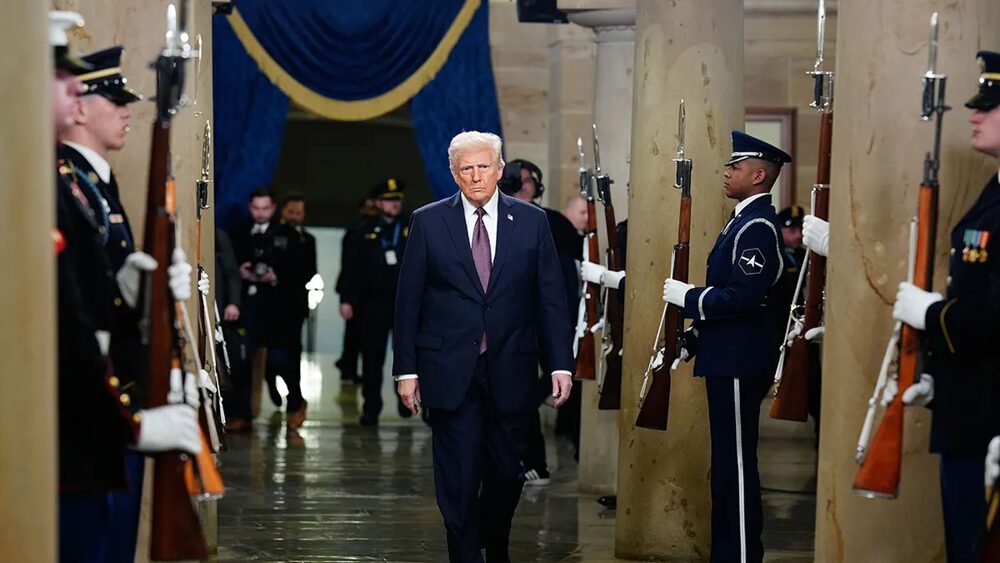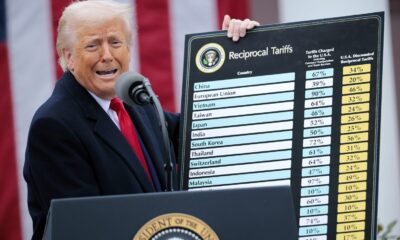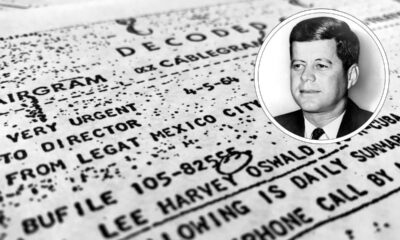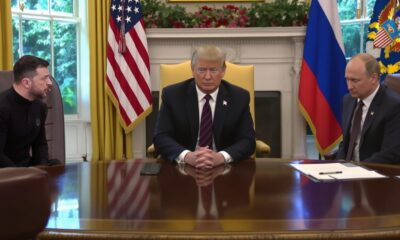Featured
Trump Unleashed: Defying a Judge to Protect America
As America watches this saga play out, one thing is clear: The conservative base is energized. They see a President who won’t let America get pushed around – not by foreign gangs, and not by domestic courts either.
Published
1 month agoon

In an unprecedented showdown, former President Donald Trump has effectively defied a federal judge’s order to halt the deportation of hundreds of alleged Venezuelan gang members. Instead of bowing to what many on the right see as an activist court, Trump forged ahead – a bold act that has electrified his supporters and sent shockwaves through the judiciary. Conservatives hail this move as a long-overdue stand against a “weaponized” judicial system intent on undermining the will of the people. Critics scream “constitutional crisis,” but to The DOGE Report and its readers, this is Trump at his best: fearless, unapologetic, and putting American safety first.
Timeline of the Showdown
- Judge Issues Halt (Saturday): U.S. District Judge James Boasberg moved on Saturday to block Trump’s deportation flights under an 18th-century wartime law Trump invoked. He ordered an immediate 14-day halt to any removals under Trump’s proclamation so he could review its legality. Boasberg even demanded that any planes in the air turn around mid-flight.
- Trump’s Response: By the time of the judge’s order, the Trump administration had already launched the deportation flights carrying alleged gang members out of the country. The White House later pointed out that the planes were “already outside of U.S. airspace” when Boasberg intervened. In essence, Trump’s team said “too late” – they had outmaneuvered the court. As President Bukele of El Salvador cheekily posted upon the flights’ arrival: “Oopsie… too late” with a laughing emoji, highlighting that the judge’s eleventh-hour order came after the deed was done.
- Deportees Land in El Salvador (Sunday): El Salvador’s President Nayib Bukele confirmed 238 members of Venezuela’s Tren de Aragua gang (along with two dozen MS-13 members) arrived to face detention in his country’s giant new prison. Bukele, working in tandem with Trump, agreed to hold these criminals, calling it a win for regional security. U.S. officials, like Secretary of State Marco Rubio, praised Bukele as “the strongest security leader in our region” for taking in the felons. Trump triumphantly thanked El Salvador for its cooperation, vowing on social media, “We will not forget!”, and blasting Democrats’ past “incompetence” for allowing such criminals into our country.
- Aftermath: The Trump White House emphatically stated it “did not defy” the court – technically, they argue, the judge’s order had “no lawful basis” and came after the deportees were off U.S. soil. In their view, the Constitution and the historic Alien Enemies Act of 1798 give the President clear authority to remove dangerous foreign nationals in wartime-like situations. A single federal judge, Trump’s team contends, cannot dictate national security policy from the bench. The migrants in question – accused kidnappers, rapists, and killers – are gone, and a loud message has been sent: When it comes to public safety, Trump won’t be muzzled by one judge’s gavel.
Standing Up to a ‘Weaponized’ Judiciary
Trump’s actions align perfectly with a growing conservative sentiment that the judicial system has been “weaponized” by the left. For years, Republicans watched as liberal lawyers and activist groups ran to friendly courts to block Trump’s agenda at every turn. Whether it was immigration, border security, or travel bans, a single district judge could issue a nationwide injunction to stall policies elected by the people. Conservatives view this as an abuse of judicial power – an attempt by the left to accomplish in court what they failed to win at the ballot box. As former House Speaker Newt Gingrich put it, there is “no constitutional basis for these judges’ ‘radical’ worldview”. In other words, Trump’s base believes many judges have strayed beyond interpreting the law and into brazen partisanship.
By refusing to yield to Boasberg’s order, Trump struck a chord with those who feel the judiciary has been hijacked by activist ideologues. The notion of “weaponization” isn’t just rhetoric – House Republicans even created a special committee to investigate the weaponization of government, reflecting deep concern that institutions (courts included) are being used to target conservatives. Here we have a President saying “enough”. Rather than passively accept a dubious ruling, Trump acted decisively in what he perceives as the nation’s interest. This confrontational stance sends a clear signal: national security and the will of the elected executive will not be held hostage by judicial overreach. For the American right, that’s a feature, not a bug. They cheer that Trump is finally putting an end to “government by injunction” – the practice of unelected judges stymying policies that a majority of Americans voted for.
Republicans Cheer the Bold Move
Unsurprisingly, Republican leaders and right-leaning media figures have rallied behind Trump’s stance. They see a President defending American communities from violent foreign gangsters while a liberal judge tried to shield those criminals on U.S. soil. “There were violent criminals and rapists in our country. Democrats fought to keep them here. President Trump deported them,” declared Vice President J.D. Vance, summing up the view from the right. His blunt statement frames the contrast sharply: Trump on the side of law and order, versus Democrats and judges on the side of, frankly, lawlessness.
Other conservatives echoed that theme. Rep. Jim Jordan called the judge’s ruling “nonsensical”, blasting the idea that a technical legal argument should block the removal of “bad people”. (As Trump himself said about the deported group, “I can tell you this: these were bad people”). On Fox News and talk radio, the refrain was consistent: Thank goodness Trump had the guts to do what’s right. They argue that left-wing activists (whom one Texas radio outlet described as “leftist groups”) manipulated the courts to protect gang members, putting Americans at risk. Who is really in the wrong here? – the critics ask – The President fulfilling his duty to keep Americans safe, or the judge who tried to throw a wrench in the works at the last minute? The answer is obvious—by defying the court order, Trump delivered on his promise to prioritize American lives and sovereignty over political correctness.
Even members of Trump’s administration were unapologetic. Press Secretary Karoline Leavitt slammed the judge’s intervention as baseless and asserted that courts have no business micro-managing the President’s foreign-affairs and security decisions. “A single judge in a single city cannot direct the movements of an aircraft carrier full of foreign alien terrorists,” Leavitt quipped, mixing metaphor and fact to drive home the point. The right-wing media lauded this quote, seeing it as a mic-drop moment exposing the absurdity of allowing one D.C. jurist to jeopardize an entire operation to remove dangerous criminals. Republican voters and MAGA supporters are standing and applauding – in their eyes, Trump not only flexed his constitutional muscle but also outsmarted a system rigged against him.
Judicial Authority vs. Executive Power: Echoes of History
Trump’s tussle with Judge Boasberg has also reignited a classic American debate: Who ultimately calls the shots – the President or the courts? Throughout U.S. history, there have been moments when executive power has challenged judicial authority, though none in recent memory as dramatic as this one. Conservatives are quick to point out that Trump’s stance is hardly without precedent. Andrew Jackson, a populist president whom Trump admires, famously refused to enforce a Supreme Court ruling protecting Cherokee tribal lands. “John Marshall has made his decision; now let him enforce it,” Jackson supposedly scoffed. Indeed, in the 1832 Worcester v. Georgia case, the Court held that Georgia’s laws violating Cherokee sovereignty were unconstitutional – President Jackson ignored the ruling and declined to enforce it. The result? Jackson removed the impediments to his policy (for better or worse), and the Supreme Court was left looking impotent. Old Hickory’s defiance is remembered as a daring (if controversial) use of executive muscle, and many on the right see Trump in the same mold here.
Another example often cited is Abraham Lincoln during the Civil War. When Chief Justice Roger Taney (sitting as a circuit judge) issued a writ in Ex parte Merryman to free a Confederate sympathizer, Lincoln simply did not comply. He believed the survival of the Union trumped one judge’s decree. Historians note that Lincoln’s administration “did not comply with the rule of law” in defying Taney’s order, essentially arguing that in an emergency, the President could nonacquiesce to a judicial ruling that endangered the nation. Fast forward to 2025 – Trump’s supporters argue that the flood of criminals and cartel affiliates over the border is a national emergency tantamount to war. Trump himself invoked the Alien Enemies Act (1798) for the first time since World War II precisely to treat these gangs as enemy agents. In that context, they say, his refusal to turn the planes around isn’t a crisis – it’s common sense. Like Lincoln, Trump can claim he put the country’s safety above one judge’s legal theory.
Naturally, these comparisons are debated. The left and many legal scholars worry that if a President can flout court orders at will, it threatens judicial authority and the rule of law. But the right counters that the greatest threat is an unchecked judiciary that can’t be overruled even when it’s wrong. In the end, this episode may be headed for a higher court showdown – but for now, Trump has called the judiciary’s bluff. And conservatives are loving it. They see a judiciary that has for too long acted as a super-legislature finally being put back in its place. After all, judges have no armies or police – their power ultimately hinges on executive enforcement. Trump’s maneuver has reminded everyone of that stark fact.
A New Era of Bold Leadership (Powered by Doge Energy)
Trump’s triumph over the court order symbolizes something even bigger: an era of leaders unafraid to challenge the status quo. It’s the same spirit that Elon Musk embodies in the tech world – a refusal to be cowed by elites or constrained by the old rules. Musk took on entrenched industries and even the censors of Big Tech (turning Twitter into X, championing free speech), and he did it his way. Trump, likewise, is taking on the entrenched legal establishment and doing exactly what he promised. Both men are beloved by a populist base because they deliver results and aren’t afraid of a fight. It’s no wonder many Trump supporters are also fans of Musk (and yes, many are fans of Dogecoin too – the meme cryptocurrency that pokes the establishment in the eye). The Doge ethos is all about shaking things up with a bit of humor and lots of passion. In a way, Trump sending a planeload of criminals out of the country in defiance of a judge has that same maverick meme energy: Such wow, much leadership!
As America watches this saga play out, one thing is clear: The conservative base is energized. They see a President who won’t let America get pushed around – not by foreign gangs, and not by domestic courts either. In this pro-Trump, pro-Musk, pro-Doge corner of the world, that’s the kind of leadership we’ve been craving. Trump’s refusal to comply with what he saw as a rogue court order means more than just one victory in the immigration wars. It’s a reassertion of democratic accountability – reminding the bureaucrats and judges that “the people,” through our elected president, are ultimately in charge.
In the end, judicial authority in the United States has been tested by this episode. Some fret it’s been weakened, but others argue it’s been rightfully checked and balanced. The Founders never intended for unelected judges to hold veto power over every security decision. President Trump’s actions underscore that principle. He drew a line in the sand and dared the courts to cross it – and this time, the courts blinked. For those of us at The DOGE Report, and for millions of Americans who are tired of seeing our safety subordinated to legal games, it’s about time. Trump 1, Activist Judge 0. And that score has a nice ring to it.
You may like
-


BREAKING: Trump’s Tariff Offensive Spurs Huge Economic Wins
-


BREAKING: Trump Declares April 2nd ‘Liberation Day’ With Historic Tariff Blitz To Reclaim American Greatness
-


Bondi Drops Hammer: DOJ Task Force Declares War on Deep-State Fraudsters Looting Your Tax Dollars!
-


80,000 Newly Declassified JFK Files Detail CIA Secrets, Mafia Links, and Fresh Clues
-


SpaceX to the Rescue: Elon Musk Shines Where Government Fails
-


Trump’s Historic Ukraine Ceasefire Explained: A Detailed Timeline of Critical Events
